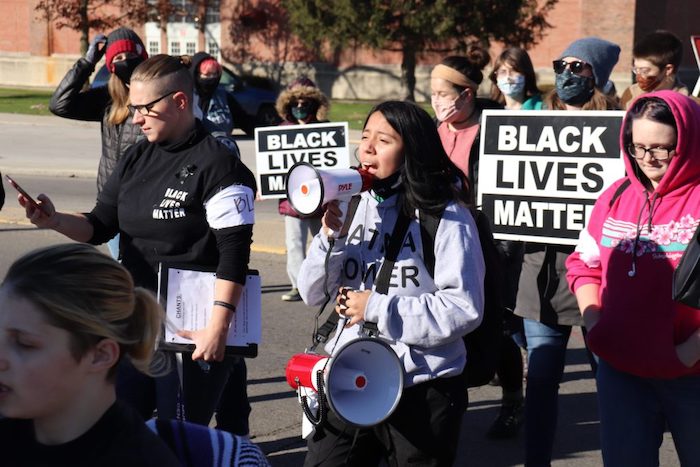The Indiana Senate Education and Career Development Committee heard hours of testimony against House Bill 1134 on Wednesday, after voting to amend the bill to massively reduce its scope and soften its language. The changes came amid heavy opposition to the bill from the public, led by rank and file educators whose militant organizing forced the teachers unions to adopt a more aggressive pressure campaign.
Commonly referred to as the “CRT bill” in corporate media, a misleading title that plays into the far right’s messaging, HB 1134 is the House counterpart to Scott Baldwin’s Senate Bill 167. That bill was pulled after Sen. Baldwin made national news for telling a social studies teacher that educators should be “neutral” when presenting the crimes of fascists and Nazis to students.
In reality, HB 1134 is one of many bills that advance a far-right assault on schools. Other related bills have also advanced: House Bill 1130 would require school boards to hear public comment, a response to decisions by some boards to eliminate public comment after right-wing forces disrupted meetings to urge school boards to lift mask mandates and censor the history of white supremacy, slavery, and racialized capitalism in the United States.
House Bill 1041, which would ban transgender girls from playing on girls’ school sports teams, was also approved Wednesday by a vote of 8-3 in the same committee. The ACLU has promised to sue the state if it is signed into law.
Anti-democratic process allows senators to sidestep most testimony against HB 1134
Committee chairman Sen. Jeff Raatz, who illegally told the public that they could not record testimony last week, announced that he would not allow the 200-plus people who had traveled to the statehouse to actually testify. An arbitrary end time of 6:30 p.m. was announced, and only a few dozen people were permitted to speak on HB 1134 before the meeting adjourned.
Insultingly, Raatz told those present to testify on the bill as amended. Sen. Linda Rogers, the bill’s sponsor in the Senate, released her amendment to gut the bill late Tuesday afternoon. Organizers rushed to understand the ramifications of the changes even before they were adopted, but the committee met less than 24 hours after the amendment was publicized. No matter the lame attempt to appease opponents, what’s of HB 1134 would still be an imposition to educators and students.
How are teachers supposed to convince our students that this system of government is the best possible one in existence, as the version passed by the House would require, when they can see the corrupt, anti-democratic games legislators play with laws governing their own lives?
Goal is to silence progressive teachers and students, censor radical thought in schools
The attacks on schools from the far right are motivated by the critical function schools play in educating and raising children, and the consequent role they have in shaping the ideological outlook of young people. The corporate ruling class is terrified at the prospect of anti-racist, LGBTQ-accepting, and especially of anti-capitalist ideas taking root in youths’ imaginations.
When the anti-racist rebellion of 30 million people thundered through the United States in 2020, even small towns held protests affirming the dignity and worth of Black life. Dozens of cities and towns across Indiana were among them, including swathes of rural Indiana—even small, predominantly white towns like Mooresville and Paoli held anti-racist demonstrations.
The consciousness around the question of Black liberation has radically shifted in America, and young people have not been caught unawares or on the sidelines. Youths are at the forefront of that struggle in every community, and have taken that energy back into their schools as they return to in-person learning. From wearing clothing with slogans defending Black life, joy, and dignity to establishing pro-Black, pro-LGBTQ, and socialist student organizations, young people are continuing to build a movement that can win the radical demands that legislators ignore.
Although bills like House Bill 1134 and its partner legislation are advancing steadily through the statehouse, networks of militant workers, students, and community members have been empowered to fight back against the rising tide of far-right momentum directed at schools. The partial success of this movement is indicated by the feeble concessions the right was forced to make on HB 1134. Continuing to grow and develop a united front of workers, students, and community is needed to safeguard our students, teachers, and workers who are committed to the anti-racist struggle.

